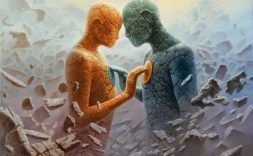
Arquivo para April 12th, 2017
Effective historical consciousness, pain and the Other
In this sense, we speak of an inversion of consciousness, but  consciousness in Hegel and in all Enlightenment, it follows that experience is translated into a dialectical movement of consciousness with itself. In the last instance, in absolute knowledge one perceives Identity of subject and object, but in the logic of fusion and not the distinction between subject and object. This removes all possibility and legitimacy from experience, since man has to be in the very content to accept it and the consciousness to acquire certainty of itself;
consciousness in Hegel and in all Enlightenment, it follows that experience is translated into a dialectical movement of consciousness with itself. In the last instance, in absolute knowledge one perceives Identity of subject and object, but in the logic of fusion and not the distinction between subject and object. This removes all possibility and legitimacy from experience, since man has to be in the very content to accept it and the consciousness to acquire certainty of itself;
In Gadamer’s logic, “the essence of experience is here thought from the beginning, from something in which experience is already overcome.
For experience itself can never be science, “in addition, Heidegger warns that Hegel does not think of experience as a dialectic; On the contrary, visualizes the dialectic from experience, it would be said that it is not the consciousness of the world, but the world of consciousness.
If from experience one never makes science because there is “an insurmountable opposition to knowledge and to that teaching flowing from a theoretical or technical knowledge,” object of several studies of ours, because one always faces an opening for other experiences. One must accept the fact that certainties and dogmas do not last forever and are subject to change. The only plausible certainty is impossibility of knowing everything.
The more experienced an individual is, the more awareness he has of the infinite possibilities of the human being and the more he is aware of his Being.
Thus the path made Gadamer possesses elements to conclude that experience is the consciousness of one’s own human finitude and limitations, a reference to classical philosophy, in Aeschylus is quite illustrative: “to learn by suffering”, that is, painfully, the Man becomes aware of his separation from the divinity and temporality of his existence. Every experience, no matter how consumed or exhausted, always constitutes openness. Not even man has an essence. Being means a power to be itself, because it has the characteristics of indefinition and the infinite possibilities. In this way, it becomes incoherent to speak of experience in the teleological sense, as Husserl and Bacon, and Hegel’s deformed form.
Tradition has to reach experience, just as language is complementary and from it comes speech, which is a you, you must differentiate your experience from truly hermeneutic experience, see works by Paul Ricoeur and Emmanuel Lévinas, while the first Can take place in the form of knowledge of persons, making you an object of analysis, or recognizing it as a person, but still remains with reference to the interpreter itself, hermeneutics allows the other as an interpreter is therefore a step forward in knowledge Of truth.
The hermeneutic experience is one that assumes the consciousness of the actual history. Tradition has to be truly understood as a you. All otherness has something to say and its condition of another must be respected. Pretensions or preconceptions can not be imposed. The opening occurs in a mutual way, that is, between those who “listen” and those who “speak something”, even with the possibility that it is contrary to the interpreter, according to Gadamer.

